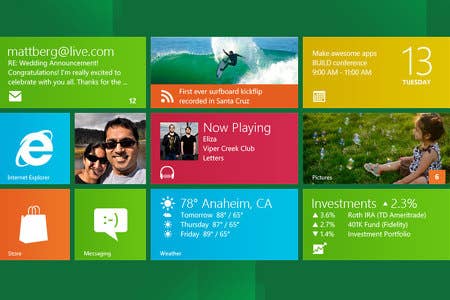Tech Focus: The Evolution of Steam and the "Windows 8 Catastrophe"
Digital Foundry on why Valve is embracing Linux as a hedge bet against the new Microsoft OS.
Valve's Gabe Newell is no stranger to controversy. PlayStation 3 was "a waste of everybody's time" and a "total disaster on so many levels". Xbox Live was a "train wreck" and the Xbox 360 itself "doesn't make my life any better, and in fact, it makes it a lot worse" - and now, the latest gem: "Windows 8 is kind of a catastrophe for everybody in the PC space".
Quite why Newell believes that Windows 8 is such a disaster isn't entirely clear. Initially, he points to PC manufacturers exiting the market, and says that "margins are going to be destroyed for a number of people". Perhaps Newell knows something about Microsoft's licensing costs that we don't - he did work there, after all - but it's hard to imagine that the Seattle giant is going to hike OS costs to a degree that would bring about the end of its hugely lucrative OEM income. The mobile market isn't so clear-cut though and many believe that the future of computing will take on a more portable form: OEMs don't have to pay a penny to Google to use Android, and the introduction of licensing costs for a Windows OS on tablets and smartphones isn't going to go down very well at all.
"Windows 8 is all about the unification of tablet, phone and desktop, but the creation of the Microsoft Store effectively removes Valve and Steam from the mobile side of the equation."
Perhaps the biggest issue with Windows 8 is that it comes across very much as a product designed for strategic, business purposes that puts Microsoft's interests before its end-users': it seeks to unify mobile and desktop operating systems to an ambitious degree that not even Apple has (yet) attempted. This obviously has huge amounts of potential for Microsoft, but only a small minority of PC owners will experience that. For the average desktop user, innovations like the Metro interface have little "real life" usage in the here and now - touch-screens aren't the norm in the average office or study - and questions also need to be asked about the design of Metro itself. The multitude of "Windows 8 Challenge" videos on YouTube demonstrates the problems people have getting on with the interface.
In addition to that, the previously open platform introduces an element that is sure to rub Valve up the wrong way: the Windows Metro store is an iTunes App Store-style "walled garden", curated by Microsoft, with code running in its own virtual machine that allows for compatibility between mobile and desktop devices. Metro apps can run on all hardware running Windows 8, but crucially, non-Metro programs won't run on the mobile "RT" version of the OS. This is seriously bad news for Valve, as Steam is effectively locked out from the expansion of the Windows market as it moves into mobile territory. Bearing in mind the revenue Microsoft is likely to generate from its own "App Store", it's safe to say that the firm will do everything it can to entice developers and publishers to move there.
Valve's response? It is hedging its bets by supporting Linux - the open source OS that OEMs can adopt without incurring license fees, and which will never include an App Store-esque digital distribution channel. In the here and now, rightly or wrongly, Linux has a reputation as a nerd's OS with little mainstream interest and few of the refinements of OSX or Windows. Newell has the solution:
"We're trying to make sure that Linux thrives. Our perception is that one of the big problems holding Linux back is the absence of games," he said.
"I think that a lot of people - in their thinking about platforms - don't realise how critical games are as a consumer driver of purchases and usage. So we're going to continue working with the Linux distribution guys, shipping Steam, shipping our games, and making it as easy as possible for anybody who's engaged with us - putting their games on Steam and getting those running on Linux, as well. It's a hedging strategy."
That's Venturebeat's edited transcript of Newell's words, anyway - apparently conditions for audio recording weren't particularly great. This may explain why All Things D, also at the event, has an alternative take on what Newell said:
"The big problem that is holding back Linux is games. People don't realise how critical games are in driving consumer purchasing behaviour... We want to make it as easy as possible for the 2,500 games on Steam to run on Linux as well."


Venturebeat's version of events suggests that Valve will work with people making PC games to assist them in creating a cross-platform product that will run on Linux too. It's early days at the moment, but you can follow the progress of the Valve Linux team on their own blog now. The AllThingsD quote suggests something altogether different - that Steam will eventually evolve to run existing PC games on Linux, a situation that could potentially offer extraordinary money-making possibilities for Valve, developers and publishers alike - and change the nature of Steam itself in the process.
This may sound quite insane, but there is some precedent here. Technologies like Cider have been developed that convert across PC code to run on x86 Macs, while Wineskin sees the auto-creation of "wrappers" that runs an emulated Windows virtual machine within OSX, which in turn runs the game itself. Wineskin has proved so successful that both end-users and developers are now using it to get PC games running on Mac without the need for a direct, native port, and with the budgets and personnel at Valve's disposal, it's entirely possible that similar "wrapping" technology could be used to get a lot of those 2,500 games running on OSX - and indeed Linux (the core Wine emulator has its origins on the open source OS, of course).
As mentioned before in this column when addressing the Steambox rumours, the end-game may well be the creation of a Steam API - a layer that allows for PC games to be more easily portable to all the operating systems and devices Valve intends to support. Indeed, PC games may not be the best description for them as such by that point - they would be Steam games first and foremost, and in time they would be developed from the ground up for multiple platforms with the new API in mind.
"The end-game may well be a Steam API that allows developers to easily deploy their games across a wide array of devices and operating systems. Adding Linux support to Steam would be the first logical step here."
Regardless of whether Venturebeat or AllThingsD has the more accurate transcription of what actually went down at the Casual Connect game conference in Seattle last week, the overall message is clear. In the here and now, Steam is a predominantly PC-based system. Going forward, Valve wants to evolve the client into a full-on platform that will run independently of Windows - the ultimate hedge. Valve gets to protect itself against the threat of a fundamental shift away from the Microsoft OS, while the work also has clear value to the end-user too: the same game can run on many different devices, with Steam Cloud support allowing for persistence in game progression from one piece of hardware to the next. The only question really is whether full-on cloud gameplay streaming systems like OnLive and Gaikai will get there first with this level of functionality.
Whether video-stream gameplay takes root or not, the fact is that local technology continues to evolve at a rapid pace - especially so in the mobile space. Supporting Linux is the first step in getting Steam to run on a multitude of new devices - not just PC. By this time next year, NVIDIA and PowerVR will be running "next-gen" mobile graphics cores with the raw power to run a great deal of those 2500 Steam titles without breaking too much of a sweat. Indeed, Microsoft's Surface Pro tablet running the x86 version of Windows 8 uses a Core i5 CPU with Intel HD4000 graphics: out of the box, it should be able to handle the majority of the Steam library too - as good an indication as any of the kind of muscle mobile is moving towards. Next year's Intel integrated GPU promises to offer a 2x to 3x boost over the current Ivy Bridge chips; rest assured that the company won't stop there.
Clearly, the future is mobile and Steam represents Valve's best opportunity to monetise that - hence Michael Abrash's work on wearable computing, the firm's exploration into what it defines as the "post-touch" era, characterised as the interface that will supersede the touch-screen. With the amount of talent and money being put into this project, Linux support takes on a whole new dimension - it's difficult to believe that Valve would develop this hardware platform and then gift a new revenue stream to Microsoft, by relying on the Seattle giant for its underlying OS. In this respect, Linux is by far the better fit.
But all of that is in the future - in the far future if you take the time to read Abrash's latest, fascinating blog post on the practical challenges of implementing augmented reality. In the short term, the Linux strategy remains very much an insurance policy in case Windows 8 fails, and at the same time a rebellion against the concept of walled garden marketplaces encroaching onto an open platform.
"If people look at what they can accomplish when they can limit competitors' access to their platform, they say, 'Wow, that's really exciting'," as Gabe Newell puts it.
"Even some of the people who have open platforms, like Microsoft, get really excited by the idea that Netflix has to pay them rent in order to be on the Internet. That's not how we got here, and I don't think that's a very attractive future."

